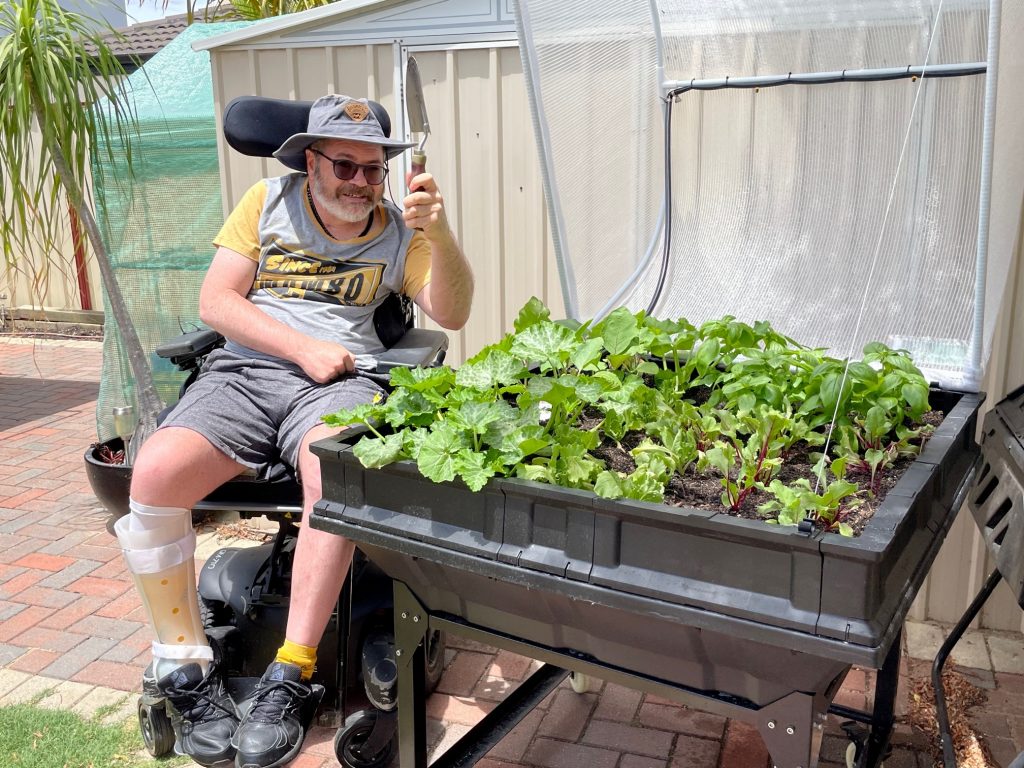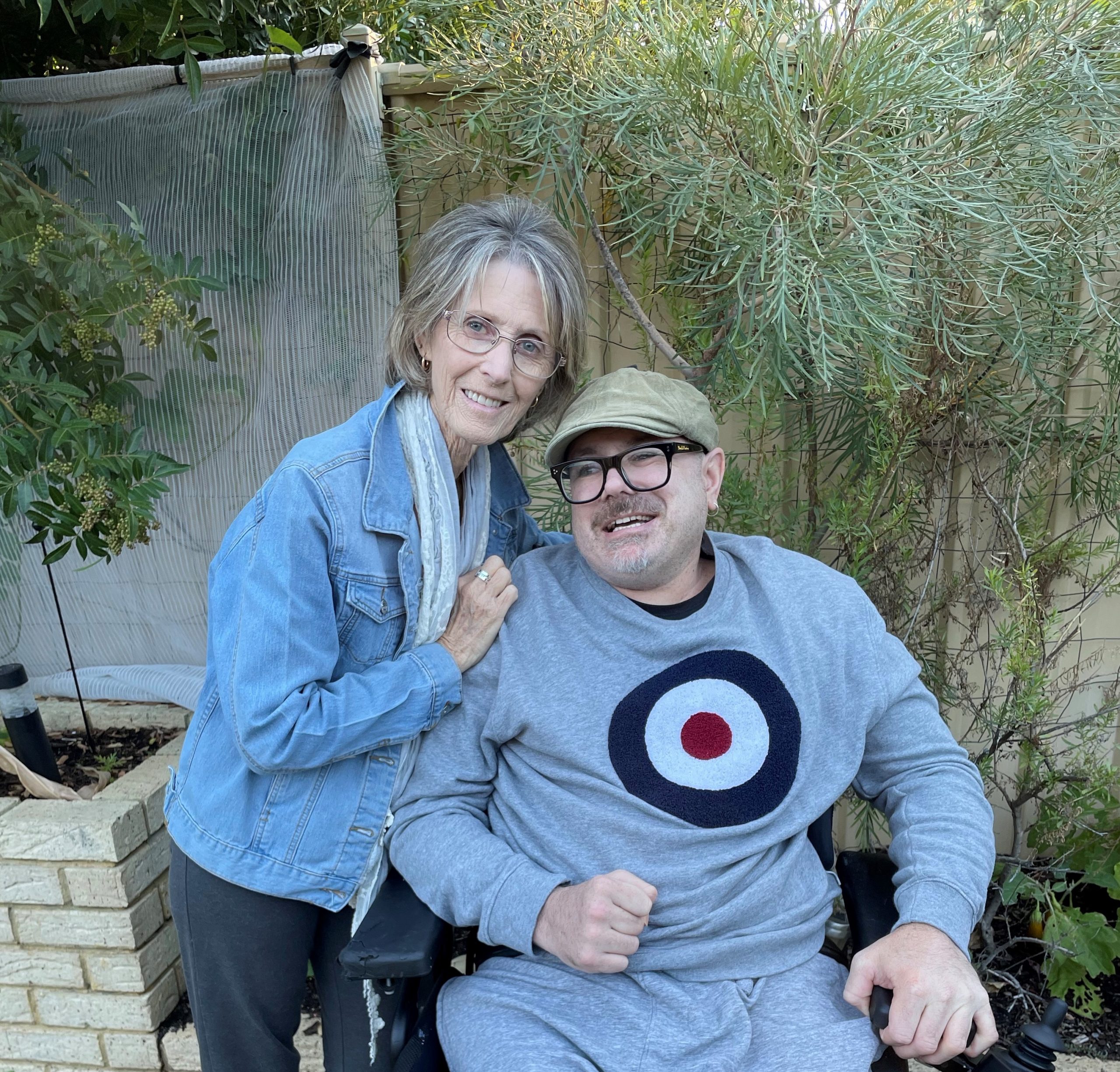Love, understanding and determination goes a long way to form great relationships, and while no relationship is without its challenges, the bond between Bryce Welch and his mum, Judy Welch, is certainly air tight.
“From cradle to present day, my mum has had my back,” Bryce said.
“Whether that be cheering me on the sporting field or holding my hand in hospital, she’s always been by my side.”
Bryce, a committed green thumb and IT extraordinaire, acquired a brain injury after a motor vehicle accident in 1995 at 18 years-old, which left him with limited mobility. Bryce now uses a powered wheelchair at home and to access the community, and has used Rocky Bay’s community services for over 20 years, as well as therapy and equipment services.
“Mum has been on call for all of the last 26 years since my accident and has had to rescue me a few times, and she’s never got angry. We’ve always worked well as a team to get me out of any tangles,” Bryce said.
“She’s a fun-loving mum. She’s smart, occasionally puts me to the test. She is fairly humorous, at times without her knowing it…sometimes at her own expense,” Bryce jokes.
Judy speaks very highly of Bryce, who in turn has been a source of strength for herself.
“(Bryce’s) acquired disability hasn’t changed some things, but has severely limited his abilities in many ways. It tears at my heart-strings, but when I see how he handles some tasks, and they really must be hard for him, he still gives it his all,” Judy said.
Just over two years ago, Judy was diagnosed with tongue cancer, followed by surgery involving a tracheostomy. Bryce’s own experience is what helped her get through.
“Remembering back to Bryce’s trauma days, I recalled all the details, then I thought if he could do it for so long, I could manage it for a week or two,” Judy said.
“I knew what to expect. We now have similar problems with speech and swallowing, so I take inspiration and lessons from him. He’s a huge support and I just love those hugs I get.
Living just minutes down the road from Bryce in the Wanneroo area, Judy said that she was once his first call for assistance 24/7, sometimes a few times a day.
“It may have been that he dropped something on the floor and couldn’t retrieve it, or something more serious,” Judy said.
“Whatever it was and whatever time, night or day, I would go to him, or quickly arrange for someone else, as I was still working until about four years ago.”
Bryce now receives assistance with daily living from his trusted live-in carer, which Judy says gives her and the rest of the family peace of mind.
Bryce’s great passion for gardening has also been able to flourish in recent months, thanks to his new vegepod, a gift from the Rocky Bay Wishing Tree.
Bryce’s Rocky Bay physiotherapist submitted the wish for Bryce, who can now tend to his garden independently when he chooses from an accessible height from his wheelchair, and also enjoys sharing his passion.
“Bryce loves the vegepod and is amazed at how quickly things have grown,” Judy said.
“We have Bryce lifting his chair to a good height, it works really well. Accessibility is paramount.”

With Bryce receiving the additional support he needs from his live-in carer, Judy is able to take some time for herself when needed, explaining that self-care is an important factor for people who support a loved one with a disability. Judy gets her “sanity fix”, as she calls it, by volunteering.
“Even just a few hours is a wonderful release – you make new friends, and they become your new support group; great for your mental health,” Judy said.
Judy offers some advice from her experience, for others in a similar position of caring for a loved one.
“Just a quick FaceTime or Zoom makes a difference to someone alone or lonely…and if they live with you, the opportunity to have respite organised if you can,” Judy says.
“It’s hard not to feel guilty or selfish when you get a holiday away or simply want time out. It’s a hard gig for us, because there’s always something constantly needed or happening.
“Make that time-out happen; all parties need it for their own sanity. Try to make sure your loved one is able to have social contacts or short holidays, even with companions and not you.”
Reflecting on his experience, Bryce advice to other people living with a disability and those who care for them is to not let others get you down, and to forge your own path.
“So many people told me I wouldn’t amount to anything, but now I have been in my own gaff (home) for years…it has to be supported and I have gone through a few carers, but I think I have found the right mix, right now.
Judy offers some final words to families who have a loved one living with a disability and who may be facing new challenges.
“Never give up on a loved one. Look at their abilities and nurture them.
“Your loved one is living with their disability, not suffering from it; but they need assistance with the living part, and that’s where we come in.”
